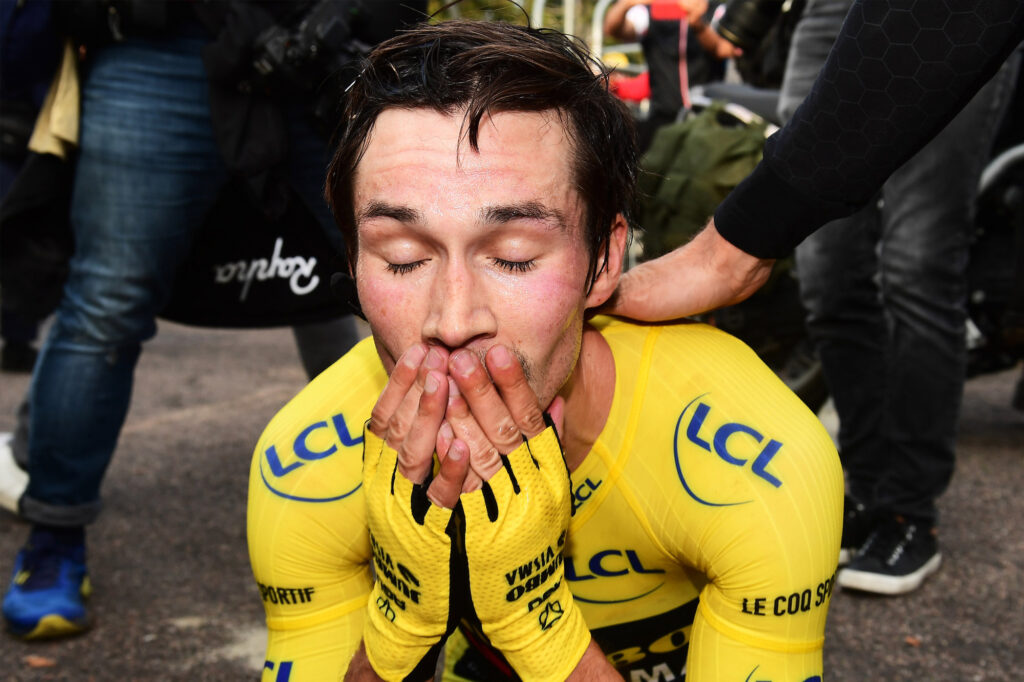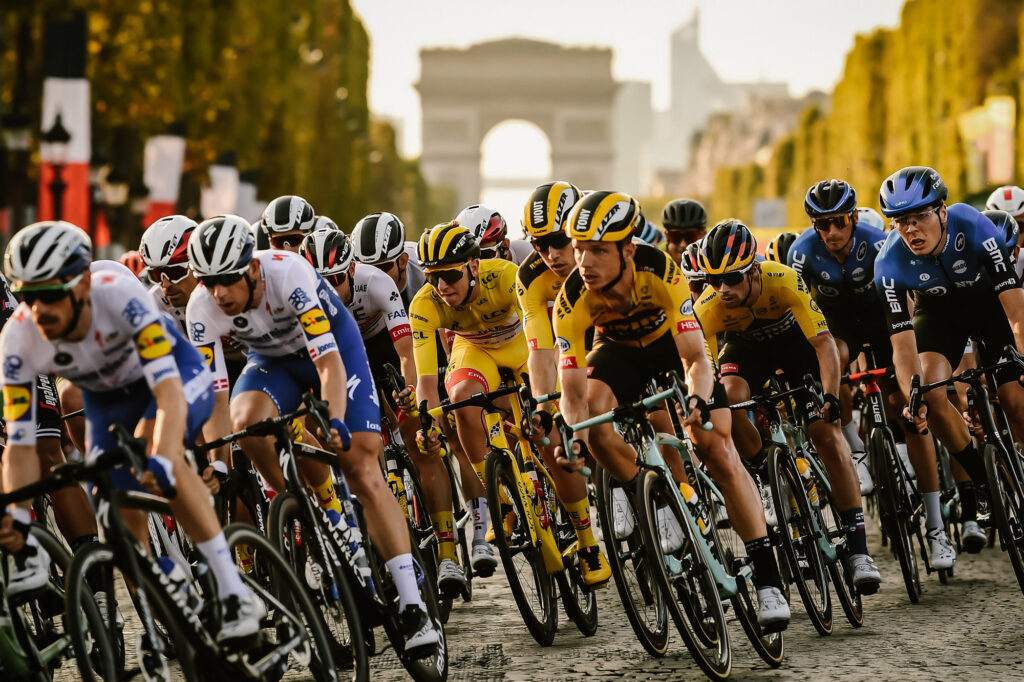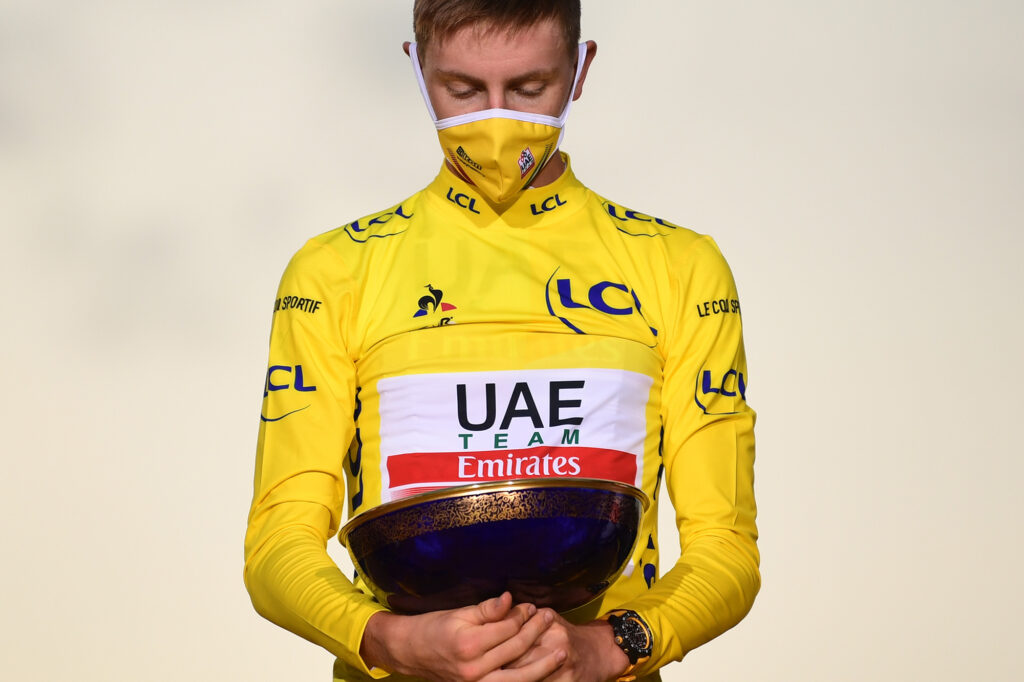Words by William Fotheringham | Photos by SWpix.com / A.S.O.
The French like to use a Franglais term, le hold-up, to describe a scenario where an English sports fan would just say, “we was robbed.” Pierre Brambilla. Herman Van Springel. Laurent Fignon. Primoz Roglic: the victims of cycling’s most surprising heists, all of whom lost a seemingly assured victory in the Tour de France in a sudden and shocking manner on the final weekend.
In the space of a few kilometers up the ascent of La Planche des Belles Filles on Saturday, Tadej Pogacar joined the ranks of the great “heistmeisters of the Tour”: Jean Robic, who won in 1947 when he attacked Brambilla on the Côte de Bonsecours in Rouen to high-tail it for Paris and victory; like Jan Janssen in 1968, and Greg LeMond in 1989, “Pog”’s victory was a time trial, and in blasting Roglic out of sight he overturned a seemingly impregnable 57sec lead.
Everyone who is involved with the Tour – except perhaps from a rider or manager who might be on the receiving end – wants to see what Geoffrey Nicholson called the great “bouleversement”, the event that completely up-ends expectations. Pogacar’s winner-takes-all victory at La Planche was one such: it gave him the stage, the King of the Mountains and the best-young-rider’s jersey. To turn events around, it takes a rider of determination and courage, with the killer instinct of a paid assassin. The young Slovene clearly has all these, at just 21 years of age.
Events at La Planche, where Pogacar ripped time from Roglic at a rate of 13sec per kilometer, should rank alongside other great bouleversements , even those which didn’t occur on the final weekend of a Tour: Lucien Van Impe’s dramatic attack to win the 1976 race at Pla d’Adet, Marco Pantani’s epic move to Les Arcs in 1998, Stephen Roche and Eddy Schepers’s ambush of Pedro Delgado on the Col de Joux-Plane in 1987. It’s not just the Tour: the Giro can recently boast Chris Froome’s massive attack in 2018 on the Finestre, the Vuelta Alberto Contador’s great day out at Fuente Dé in 2012. These episodes are what draw all of us to this sport: its capacity to surprise against expectations.

Amidst all the shock and awe at La Planche, one fact should be retained. Had Team Ineos not put the hammer down leaving Castres on stage 7, putting Pogacar in difficulty and causing him to lose 1min 21sec on Roglic, the younger of the Slovenian double act might have been defending yellow at that final time trial. Or he might not: the race would have taken on a totally different configuration had Porte and Landa in particular not dropped that time as well, and if Ineos had not calmed matters at the front a little, and chased hard behind, once Richard Carapaz had punctured. Another eternal fascination of the Tour is those multiplication of “what-if” moments. It’s three weeks of chaos theory writ large.
Had Team Ineos not put the hammer down leaving Castres on stage 7, putting Pogacar in difficulty and causing him to lose 1min 21sec on Roglic, the younger of the Slovenian double act might have been defending yellow at that final time trial.
That fascination is given a further twist by the particular context of this Tour: postponed to September, beginning with a background of uncertainty – on August 29, how many people, hand on heart, believed it would definitely see Paris? – and run to a background of (mainly but not entirely) masked faces, concluding on a spectrally empty and autumnal Champs Elysees. 2020 will always be remembered as the Tour of the Pandemic. The Tour that might not have been. The race closed with its legend intact, its reputation and status as the ultimate French national occasion enhanced. That was fortunate, but the made its own luck.
As did Tadej Pogacar. His victory was not just about that time trial, headliner though it was. With that 1min 21sec deficit to deal with, Pogacar had to go hunting for time. The seconds came at Loudenvielle, Laruns and the Grand Colombier. Critically, his climbing form meant that Roglic was never able to seal the deal. He and Jumbo-Visma may eternally regret never pushing deeper, and there may be some soul-searching over whether that was ever possible.

They never truly managed to exploit the fact that the young Slovenian had next to no team support in the mountains after losing Fabio Aru and Davide Formolo. Mostly, the controlling tactic works in the modern Tour de France. This time, it didn’t, particularly at Loudenvielle, where Jumbo-Visma wore themselves out controlling the stage but had no riders left to restrain Pogacar when he attacked on the final climb.
A statto’s dream, Pogacar. The youngest rider to cross the finish line of the Tour in the yellow jersey. The youngest stage winner since (hemhem) Lance Armstrong. The first Tour debutant since Eddy Merckx in 1969 to win yellow and polka-dots. At just inside a minute, his final advantage ranks just inside the 10 closest Tours ever.

What else to retain of the 2020 Tour de France? Just reward at last for Sam Bennett, winner of two stages – including a dominant win in the grand finale on the Champs – and the green jersey at last after a battle with Peter Sagan that created nearly as much racing and daily interest than the race for yellow (discuss). Tactical masterclasses from the Sunweb team on the stages into Sarran, Lyon and Champagnole. A rare defeat for Sir Dave Brailsford’s merry men, compensated for by a rare 1-2 on the stage to La Roche sur Foron. An emotional finish for Richie Porte, who many thought would never grace the podium of the Tour. The power and grace of Wout Van Aert and the gracefully powerful sacrifice of Tom Dumoulin. Thibaut Pinot’s umpteenth Tour de Torture. This one was always going to be very very different. The big question was how? Let us count the ways.
Back to the “hold-up” victims. Brambilla, Van Springel and Fignon have one unfortunate thing in common. They never won the Tour after their individual defeats at the death; Fignon had two wins to his name already, but Brambilla and Van Springel saw their only chance of victory go west in that one day. It is probably not what Primoz Roglic wants to hear right now.

